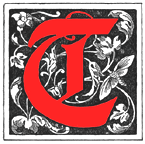
here is no word in the language which has so many meanings and which has been so used and abused as nature. Sometimes it is opposed to art, sometimes to grace, sometimes to man, sometimes to affectation; and in the foregoing paragraph I have opposed it to conscience. Now, the necessity for explanation here arises out of the fact, that the man of most authority as a moral philosopher in this country, Bishop Butler, runs all his arguments up to the point of proving that virtuous action is according to nature. . . . Now, Butler's argument is, that a life according to conscience is a life according to nature, because conscience is part of human nature. . . . To speak of action led by conscience as natural, in the same sense in which we speak of action led by impulse as natural, is to confound speech. In common parlance, we speak of a good-natured or an ill-natured man; we say it is the nature of cherubim to know, the nature of seraphim to love. Thus, a man may be so gentle, that not for his life could he do anything unkind; or so high-minded, that it would be impossible for him to descend to any meanness, and he is never once visited by that fear of vulgar minds lest peradventure they may do something shabby. This is to act naturally; it is to act instinctively, But to act by the law and rule of conscience is altogether different; it is natural in a much lower sense. Innocence is nature, holiness is second nature; but virtue is not nature as innocence and holiness are; it is in contrast to these affected; it is, if I may so speak, artificial. And I hope I have rendered it sufficiently clear that as a moral force, tends to create or to establish a nature. It is the part of art not only to hide its own art, but to be opposed to art. It is born of nature, it follows nature, and it creates nature.
No sooner have we reached this idea of art — that in so far as it is pure and noble, it cherishes the inborn nature which we call innocence, and the engrafted or implanted nature which we call holiness, but has little to do with virtue, or the life according to conscience — than we are met in front by the philosophers. They cannot indeed tell us that the cultivation of natural impulse, and the trusting to it, is immoral; but they insist on the inferiority of impulse to conscience, of sensibility to the sense of duty. Dugald Stewart, in this country, and Victor Cousin, in France, for example, maintain that conscious endeavour after the right is something higher than instinct, that struggle and victory are something better than peaceful possession. But surely these are as shoemakers sounding the praise of leather. Intense consciousness is the all-in-all of philosophy; therefore, philosophers think that it must be the all-in-all of life. By the same rule, it would be better to eat and to drink, not guided by appetite, but by a kind animal conscience, formed out of chemical calculations, and called the sense of food. . . .
From this fierce struggle, from this life of conscious endeavour, it is the object of our religion to set us free, and if art is defective in not cultivating virtue, so is the gospel. . . . . Moralists, more than any class of reasoners, must come down from their abstractions to biography, and have to illustrate their laws by examples. [II, 194-97]
Bibliography
Dallas, Eneas Sweetland . The Gay Science. 2 vols. London: Chapman and Hall, 1866. A HathiTrust online version of a copy in the Harvard University Library. Web. 30 April 2022.
Last modified 5 May 2022